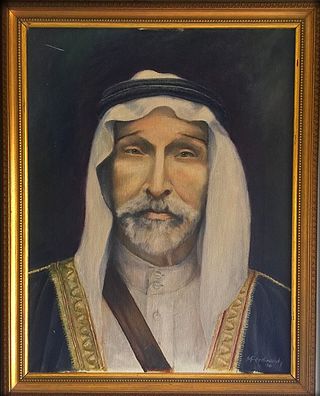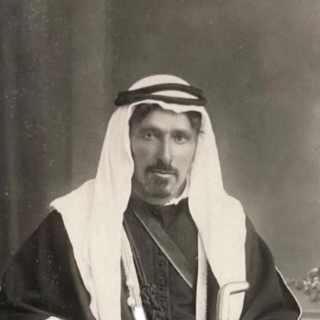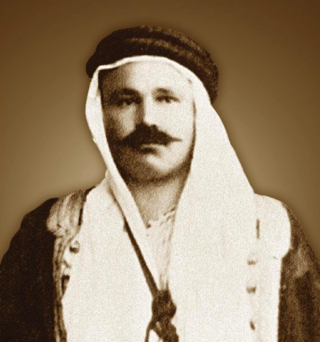Related Research Articles

The history of Jordan refers to the history of the Hashemite Kingdom of Jordan and the background period of the Emirate of Transjordan under British protectorate as well as the general history of the region of Transjordan.

The Beni Sakhar confederacy is one of the largest and most influential tribal confederacies in both Lebanon and Jordan. Its founder, Sakher bin Tha'labah al Tayy, likely lived in the 3rd century AD, making the tribe around 18 centuries old. The Bani Sakher began migrating to The Levant as early as the 16th century and grew to become an influential tribe as by around the mid 18th century.

Fayez Tarawneh was a Jordanian independent politician, who served twice as the 31st Prime Minister of Jordan, and also as Chief of the Royal Hashemite Court.

Body of Lies is a 2008 American spy action thriller film directed and produced by Ridley Scott, written by William Monahan, and starring Leonardo DiCaprio, Russell Crowe and Golshifteh Farahani in the lead roles. Set in the Middle East, it follows the attempts of the CIA and the GID of Jordan to catch "al-Saleem", a terrorist. Frustrated by their target's elusiveness, differences in their approaches strain relations between a CIA operative, his superior, and the head of Jordanian Intelligence. The supporting cast features Mark Strong and Oscar Isaac.
Barazin, also spelled Barazayn, is a town in the Amman Governorate of north-western Jordan.
The Adwan Rebellion or the Balqa Revolt was the largest uprising against the newly established Transjordanian government, headed by Mezhar Ruslan, during its first years.
Mamdouh bin Abdulaziz Al Saud was a Saudi Arabian businessman, the governor of the Tabuk Province, and a member of the Saudi royal family.

Haditha Ali Abdullah Al-Khraisha was a Jordanian Bedouin tribal leader. He was one of the two paramount sheikhs of the Bani Sakhr Tribe, arguably the most powerful tribe in Jordan. Haditha headed the northern clans of the Bani Sakher (al-Ka'abnah), while Mithgal Al-Fayez headed the other half, (al-Twaga). In the early twentieth century, Haditha and the Bani Sakhr, in addition to other Trans-Jordanian tribes such as the Huweitat and the Belqawiah, fought the Wahhabi Ikhwan, a religious militia who helped establish Abdul Aziz Ibn Saud as the first King of Saudi Arabia. The Wahhabi Ikhwan were Abdul Aziz Ibn Saud's tool for territorial expansion and lent religious legitimacy to Ibn Saud's territorial and political ambitions. According to King Faisal Al Saud the armed resistance that Bani Sakhr put up against Ibn Saud and the Wahhabi Ikhwan was "the reason that Saudi Arabia's borders do not extend all the way to Palestine and why the Al Sauds never became the rulers of the Levant". Haditha was known throughout Arabia for his wisdom and chivalry, He played a significant role in building the nascent Jordanian state and shaping its development. An ally and supporter of King Abdullah I, Haditha served several terms as Senator and Parliamentarian, including the first Jordanian Senate in 1947 which consisted of only ten members. Haditha was also elected to the second Legislative Council in June 1931, and the Fourth Legislative Council in 1937 while Jordan was still an Emirate. Haditha was also one of the founding members of the Jordanian Solidarity Party in March 1933. Sheikh Haditha also cultivated the oasis of Azraq, Jordan.

Mithqal bin Sattam bin Fendi Al-Fayez (Arabic: مثقال الفايز, was a Jordanian political and tribal figure whose work helped the establishment of The Hashemite Kingdom of Jordan. Mithqal was one of the two leading sheikhs of Bani Sakhr; he took power in the early twentieth century, and headed the Bani Sakhr tribe generally and the Al-Twaga half of the tribe specifically, which consisted of the four major clans, Al Ghbeyen, Al Ghuful, Al A'lqam, and Al Tabtab, which comprise 32 sub-clans which further divide into more sub-clans. He also headed his own clan, Al-Fayez.

Amer Talal Al-Fayez (Arabic: عامر طلال مثقال الفايز, is a Jordanian statesman and politician that served as the Head of Royal Protocol and is currently the president and chairman at Al-Abdali Investment & Development PSC.
The House of Fayez(Arabic: الفايز or, colloquially: Al-Fayez, Alfayez, Al Fayez, Al Faiz, Al Fayiz) is a noble sheikhly Jordanian family that heads the major Jordanian clan Bani Sakher. The family's influence and prominence in the region was at its ultimate under Fendi Al-Fayez, who led the family in the 1840s and gradually became the leader of the entire Bani Sakher. Fendi would rule large parts of Jordan and Palestine, including the ancient Kingdoms of Moab and Ammon, and parts of modern-day Saudi Arabia until the late 1860s when a series of battles with the Ottoman Empire decreased the family's resources and claimed a portion of its holdings. After Fendi, his young son Sattam led the tribe in a push to cultivate the lands and live a more sedentary lifestyle, then under Mithqal Alfayez as a permanent political power in modern Jordan. The family was the largest owner of land in Jordan and owned portions of modern day Palestine, and Mithqal was the single largest owner of private land in the kingdom in 1922. The Al-Fayez family is active in Jordanian and Arabian politics and is currently headed by former Prime Minister Faisal Al-Fayez.

Akef Mithqal Al-Fayez was a Jordanian politician born in Amman, Jordan. He held several ministerial positions and became speaker of the Jordanian Parliament for several sessions and a member of the Jordanian Senate.

Fendi bin Abbas bin Awad Al Fayez was an Arab leader and a sovereign Emir from the Al-Fayez family who was the paramount Sheikh of the Bani Sakher Clan from the 1820s up until his death. He is widely regarded as the most influential figure in the Bani Sakher, dubbed the Old King east of the Jordan and one of the most powerful tribal figures in Arabia in the 19th century. Fendi's first documented tribal battle was as early as 1820 when he was just twenty years old.

Sattam bin Fendi bin Abbas Al Fayez (Arabic: سطام الفايز, was an emir who led the Bani Sakher tribe from 1881 until his death in 1891. He was the de facto ruler of the Bani Sakher after his father Fendi Al-Fayez gave him most of his responsibilities in the late 1870s, and was the first person to have led Westerners to view the Moabite Stone in 1868. Sattam was also the first tribal sheikh to begin cultivating land in the 1860s, which began the sedentary settlement process of many of the biggest tribes in Jordan. In September 1881, after the reunification of the Al-Fayez family under Sattam, he was recognized by the Ottoman Administration as the Emir of Al-Jizah and the paramount Shaykh of the Bani Sakher clan.
Trad Mithqal Al-Fayez is a Jordanian politician born in Amman, Jordan. He was the minister of Agriculture, an ambassador of Jordan to multiple countries, and a member of the Jordanian senate.

Talal bin Fendi bin Abbas Al Fayez (Arabic: طلال الفايز, was a Beylerbey from the powerful Al-Fayez family. He led the Bani Sakher tribe from 1891 until his death in 1909.
Sami Mithqal Al-Fayez was a Jordanian senator and Arabian tribal figure who was the paramount sheikh the Bani Sakher.

ٍSaeed Pasha Khair was a Jordanian politician born in Al-Salt, Jordan. He was the fifth Mayor of Amman and the first in the during the Emirate of Transjordan. He played a key role in Amman becoming the Capital of Jordan.

Hamad Pasha Al-Basil was one of the leaders of the national movement in Egypt in 1919. He served as the tribal chief of Al-Rumah tribe in Fayoum, a member of the Legislative Assembly, the deputy speaker of the House of Representatives in 1924, and the deputy of the Egyptian Delegation, and he founded the Saadist Wafd Party.
References
- ↑ "King promotes Gen. Saad Khair to Field Marshal". The Royal Hashemite Court. 5 May 2005.
- ↑ Yoav, Alon (2016). The shaykh of shaykhs : Mithqal al-Fayiz and tribal leadership in modern Jordan. Stanford, California: Stanford University Press. p. 90. ISBN 978-0-8047-9934-8.
- ↑ Yoav, Alon (2016). The shaykh of shaykhs : Mithqal al-Fayiz and tribal leadership in modern Jordan. Stanford, California: Stanford University Press. p. 43. ISBN 978-0-8047-9934-8.
- ↑ "Field Marshal Saad Khair passes away". Ammon News. 9 December 2009.
- ↑ King Abdullah II of Jordan, Our Last Best Chance , New York, New York: Viking Press, 2011, p. 221
- 1 2 NDR, OCCRP, Daraj, Süddeutsche Zeitung (2022-02-21). "Bank of Spies: Credit Suisse Catered to Global Intelligence Figures" . Retrieved 2022-02-21.
{{cite news}}: CS1 maint: multiple names: authors list (link) - ↑ Ignatius, David (14 December 2009). "Pasha of the spies". The Oregonian.
- ↑ Bin Al-Hussein, Abdullah II (2011). Our Last Best Chance. London: Penguin Group. p. 92. ISBN 978-1-101-19013-5.
- 1 2 Ignatius, David (2009-12-13). "Jordan's ex-spy chief wasn't too good to be true". MTV.com. Washington Post. Retrieved 2012-08-26.